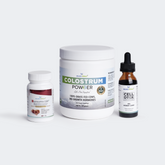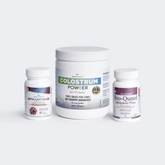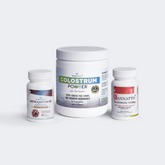What Is Vitamin E Good For? Understanding Its Impact on Your Health
Estimated Reading Time: 8 minutes
|Millions of people worldwide use Vitamin E supplements. Yet, not everyone knows exactly what Vitamin E is good for. If you're also one of those, you're on the right blog.
This blog discusses the importance of Vitamin E, its key role in your body, and why you should take Vitamin E supplements.
Introduction to Vitamin E
Vitamin E is a vital fat-soluble compound that plays a key role in keeping the human body healthy. As one of the essential fat-soluble compounds and antioxidant vitamins, vitamin E helps protect cells from oxidative damage and supports many biological functions.
What are the Health Benefits of Vitamin E
Let's learn more about Vitamin E and its role as an antioxidant.
1. Vitamin E As An Antioxidant in Combating Oxidative Stress
You might have heard of free radicals. Those unstable molecules can harm cell membranes and contribute to the development of chronic health conditions, such as cardiovascular disease and certain types of cancer. By neutralizing these free radicals, Vitamin E:
- Support the immune system.
- Help maintain the integrity of blood vessels and other tissues.
- Support skin cells, eyes, immune system cells, and cardiovascular system cells.
- Regulate cholesterol levels, manage healthy blood pressure, and potentially reduce the risk of high blood pressure.
2. The Protective Role of Vitamin E in Disease Prevention
Vitamin E's reputation as a health-boosting nutrient is well-earned, especially when it comes to disease prevention. Thanks to its potent antioxidant properties, vitamin E helps defend the body against oxidative stress and inflammation—two key factors in the development of chronic diseases.
- Research suggests that taking Vitamin E, either through diet or vitamin E supplements, may help lower the risk of cardiovascular disease by protecting blood vessels and supporting heart health.
- Beyond heart health, Vitamin E (tocotrienols) has also been linked to a reduced risk of age-related macular degeneration, a leading cause of vision loss.
- Its anti-inflammatory effects further contribute to lowering the risk of chronic conditions, like diabetes.
For even greater protective benefits, many experts recommend combining vitamin E with other antioxidant supplements, such as vitamin C and beta carotene. This combination can enhance the body's natural defenses and provide a broader shield against cellular damage.
Read More: How Tocotrienols Reduce Inflammation
3. Vitamin E Also Improve Skin Health & Appearance
Vitamin E has numerous advantages beyond its superficial appearance when it comes to maintaining healthy skin.
- Tocotrienols, a form of Vitamin E, protect the integrity of the skin against UV radiation from sunlight rays that cause premature aging and cancer risk.
- Its moisturizing properties also make it popularly found in many skin care products.
- The use of topical Vitamin E and other topical vitamin applications in moisturizers and sunscreens can help hydrate the skin from the outside and protect skin cells from damage.
- Moreover, it maintains an effective barrier against environmental damage as well.
4. Vitamin E As An Immune Defender for Seniors
Vitamin E plays an integral part in strengthening immunity for older adults. With its powerful antioxidant properties and involvement in immune function, Vitamin E can ward off viruses and bacteria more effectively than ever before.
It is especially essential when living in isolation, such as seniors. Therefore, adequate consumption of this essential nutrient is paramount to maintaining an efficient immune system in later years.
Read More: Tocotrienols vs. Tocopherols: Which One Is Better for Senior Skin?
5. Neurological Benefits of Vitamin E (especially Tocotrienols)
Recent research suggests that Vitamin E could play an integral part in protecting against Alzheimer's disease and other forms of dementia.
- All thanks to its antioxidant properties, which may reduce oxidative stress that leads to cognitive decline.
- Evidence from controlled trials and randomized controlled trials has evaluated the effects of vitamin E on cognitive decline and Alzheimer's disease, though further investigation needs to occur.
- Maintaining sufficient Vitamin E levels has been believed to promote overall brain health.
Read More: Is Vitamin E Good for Brain Function?
How to Take Vitamin E into Your Everyday Routine?
You can find vitamin E in a variety of foods, with vegetable oils, nuts, seeds, and leafy green vegetables being some of the richest sources. For those who may not get enough vitamin E from their diet, taking vitamin E supplements is a popular way to ensure adequate intake.
Many people choose to add a vitamin E supplement to their daily routine to help protect cells, support immune function, and promote overall wellness. Whether you obtain your vitamin E from foods rich in this nutrient or from dietary supplements, ensuring you have enough is an essential part of a balanced diet and a healthy lifestyle.
1. Nuts and Seeds
Nuts and seeds are considered excellent sources of vitamin E, with almonds, sunflower seeds, annatto seeds, and hazelnuts ranking among the most delicious options. A handful of each can boost daily Vitamin intake; furthermore, they make delicious snacks or additions to salads or dishes such as desserts.
2. Vegetable Oils
Wheat Germ, Sunflower, and Safflower oils are excellent sources of Vitamin E; using these in cooking or salad dressing can significantly increase your daily Vitamin intake. However, be cautious, as their high caloric content requires using them sparingly.
3. Green Leafy Vegetables
Leafy greens items like Swiss chard and spinach contain not only Vitamin E but also an abundance of other important Vitamins and nutrients that provide you with both nutritional support and variety in meals.
By including them regularly in your meal plan, these green leafy veggies provide added benefits of Vitamin E and new menu items to spice things up!
4. Fortified Foods
Many cereals and products contain Vitamin E fortifications to make their Vitamin intake easy if natural sources alone don't meet requirements. When shopping, make sure that labels indicate which options contain fortified vitamin E so you know you are getting enough!
5. Fruits
Certain fruits, such as avocados and kiwis, provide rich sources of Vitamin E. Avocados, in particular, make an easy and tasty way to increase your Vitamin intake - perfect for salads, smoothies, or simply on toast!
6. Shellfish
Shellfish (particularly shrimp and lobster) provide Vitamin E. Though their levels might not compare directly, these sources still contribute to meeting daily requirements and offer additional nutritional benefits of Vitamin E.
When Diet Isn't Enough, Go for Vitamin E Supplements
Even with their best intentions, some individuals may struggle to meet their daily Vitamin E requirements through food alone. This may be caused by various factors, including
- dietary restrictions
- health conditions that prevent absorption,
- increased nutritional needs
In such cases, you may consider Vitamin E supplementation. Here are the quick tips you must follow before selecting Vitamin E supplements.
1. Determine Your Supplement Needs
Individuals living with conditions like Crohn's disease, cystic fibrosis, or liver disorders might struggle to absorb fat-soluble Vitamins like Vitamin E.
Low-fat diets or those who have undergone gastric bypass surgery could also struggle with digesting these essential dietary nutrients, and supplementation may become necessary.
2. Selecting an Appropriate Supplement
When selecting supplements, it is crucial to select high-quality products that deliver Vitamin E in its most beneficial form. Vitamin E comes in two forms: tocopherols and tocotrienols, of which tocotrienols are more potent and effective.
Wellness Extract's range, such as Eannatto DeltaGold®, provides potent Vitamin E Tocotrienols from Annatto plants, guaranteeing natural, high-quality sources such as Wellness Extract.
3. Consultation and Considerations
Before taking any dietary supplement, it is wise to speak with a healthcare provider. They can offer guidance based on an individual's health needs and current medications.
Vitamin E doses that exceed recommended limits could even pose potential health risks, such as hemorrhagic stroke risk. It is appropriate to discuss the doses and interactions between Vitamins with your provider before beginning.
4. Supplement Wisely
Vitamin E supplements should form part of an overall health and wellness strategy. When taken alongside a varied and balanced diet.
Also, taking Vitamin E supplements will ensure you meet not only your Vitamin E requirements but also get all of the other vital nutrients essential for optimal well-being. Remember: supplements exist solely as fill-ins, not replacements!
Conclusion
Understanding what Vitamin E is good for helps us appreciate its significance in our diets, from its powerful antioxidant benefits and vital role in skin and immune health to supplementation options that ensure adequate intake.
Vitamin E Tocotrienol is an indispensable nutrient in maintaining overall well-being and quality of life. Achieve health through informed choices - including Vitamin E in that consideration process!
Disclaimer: These statements have not been assessed by the FDA. The information contained within this page is for educational purposes only. It is not intended to replace the advice or attention of health care professionals.
Frequently Asked Questions (FAQs)
Q1. Is Vitamin E good for skin?
Yes, Vitamin E is good for skin. It acts as an antioxidant. Vitamin E, particularly tocotrienol supplements, helps protect the skin from environmental damage. Vitamin E also moisturizes skin and strengthens the skin barrier.
Q2. Is it OK to take Vitamin E every day?
Yes, in the ideal dosage, Vitamin E is safe for everyday intake. You may want to consult your healthcare provider to determine the right dosage according to your health conditions.
Q3. What are the symptoms of low Vitamin E deficiency?
The symptoms of low Vitamin E include muscle weakness, numbness, and problems with body balance and coordination. A severe Vitamin E deficiency can also lead to anemia and cardiac arrhythmias.
Q4. How much Vitamin E is safe per day?
According to studies, Vitamin E is safe for daily use even at a dose of 1,000 mg/day. Higher doses, exceeding the upper limit, may cause side effects such as nausea, fatigue, and headaches.



































